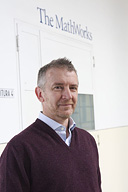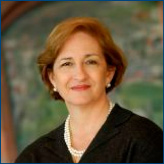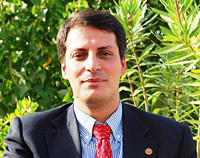EDUCON2013 Keynote Speakers
Alessandro Tarchini
EMEA EDU Business and Market Development
MathWorks
Practice makes perfect: MATLAB® and Simulink® help engineering education to balance discipline and practice
Universities are challenged by the task of preparing students to face the uncertainty caused by the “liquid modernity”: social forms and institutions no longer have enough time to solidify and cannot serve as frames of reference for human actions and long-term life plans. Technologies melt faster than existing ones can be absorbed and mastered.
To be successful, engineers need a complex integration of engineering practice skills and engineering disciplinary knowledge but, unfortunately, practice skills have become more and more difficult to include in engineering curricula.
Problem-Based Learning and CDIO can offer viable alternatives to “traditional” engineering education and Technical Computing Environments help to provide a firm grounding in Engineering Fundamentals on which to build. The connection between computational software tools and hardware represents a further step in the integration in the curricula of a “practice makes perfect” approach.
In this speech we will start from the impact that tools like MATLAB and Simulink have had on education to then discuss the best practices adopted by universities to integrate computational tools in the curricula.
The Speaker
 Born in Genova in 1962, since 1982 he has worked in ICT, initially developing firmware for numeric control systems, then spending three years at the computing data center "Sergio Borgogno", developing Finance applications for the public administration.
Born in Genova in 1962, since 1982 he has worked in ICT, initially developing firmware for numeric control systems, then spending three years at the computing data center "Sergio Borgogno", developing Finance applications for the public administration.
From 1985 to 1990 Alessandro Tarchini worked in Stratos – a company providing services to Aerospace and Defense, as a consultant to aerospace companies, representing Italy in international project teams defining and developing processes for the engine management in the civil aviation business.
In 1992, after moving to Teoresi, he expanded his interests to software systems for number crunching, modelling and simulation; since 1993 Tarchini has worked in favor of advanced numerical analysis techniques facilitating the adoption of MATLAB in Italy. In 2002, when the Italian operations of MathWorks Inc. were opened, Tarchini was appointed as the managing director of the new company.
After managing MathWorks Italian operations for 10 years, Alessandro has now moved to the role of EMEA EDU Business and Market Development.
Arnold Nevill Pears
Associate Professor of Computing Education Research at Uppsala University, Uppsala, Sweden
Using Visualisation to Strengthen Learning
The age old adage "A picture is worth a thousand words", reminds us of the power of
images and visualisation as a way to convey information and help others to gain
insight into the workings of complex phenomena. However, use of pictures or
visualisations does not automatically lead to deeper and more complete insight, or
better learning outcomes.
Work on the visual engagement taxonomy demonstrates that while visualisations
play an important role in learning activity, learner engagement with a visualisation is
crucial to enhanced learning. It is through changing parameters, predicting
behaviours, and constructing new approaches to visualising difficult phenomena that
learners achieve insight.
Visualisation and simulation also takes many forms, ranging from remote access to
physical laboratory equipment, to visualisations of program execution or
manipulation of complex data structures. In this talk we I explore my perspective on
the multifaceted nature of visualisation and draw some conclusions for tertiary
teaching and learning. In doing so I will also discuss the changing landscape of
higher education, the challenge of Massive Open Online Courses, new teaching
approaches, such as the "flipped classroom". Education in coming decades will
require new approaches, and visualisation has an important role to play.
The Speaker
 Arnold Pears is Associate Professor of Computing Education
Research at Uppsala University, Uppsala, Sweden. He received his
BSc(Hons) and PhD from La Trobe University, Melbourne, Australia,
and worked as lecturer and senior lecturer there until 1999. Since
2000 he has been employed at Uppsala University.
Arnold Pears is Associate Professor of Computing Education
Research at Uppsala University, Uppsala, Sweden. He received his
BSc(Hons) and PhD from La Trobe University, Melbourne, Australia,
and worked as lecturer and senior lecturer there until 1999. Since
2000 he has been employed at Uppsala University.
His research covers the fields of parallel programming and
architecture design, computer networking and computing education
research. He has published widely in all three areas.
Arnold coordinates the Uppsala Computing Education Research
Group (UpCERG), is a member of the Education Activities Board and
Board of Governors of the IEEE Computer Society, and Chair of the
Computer Society Special Technical Community for Education. He has
been an active contributor to the ASEE/IEEE Frontiers in Education
conference, and active in establishing a new international conference
on Learning and Teaching in Computing and Engineering (LaTiCE)
which will be held for the first time in Macau in March 2013.
Lueny Morell
Strategic Planning Team, Hewlett-Packard Laboratories, Palo Alto, CA, USA
Developing Engineers for an Interconnected Global Network
The job space of current and future engineers is our globalized world. The evolution of the world economy and high connectivity among players has forced private and public enterprises to develop new ways of conducting business as well as learning. For countries and regions to remain competitive, engineering education must evolve to continue to be a fundamental element in the creation of wealth, economic development and in the improvement of the quality of life for all citizens. This presentation will address possible changes/actions for re-engineering engineering education to develop 21st century engineers, among them re-thinking the learning environment to bridge the gap between how we teach and the practice of engineering, responding to employers and region needs, outcomes assessment & accreditation, and the need to train the engineering professor. Possibilities for partnership with HP to innovate the curriculum will also be presented.
The Speaker
 Lueny Morell, MS, PE, is Program Manager in the Strategic Planning Team at Hewlett Packard Laboratories (HPL) in Palo Alto, California where she focuses on identifying research partnership opportunities for HP Labs with emphasis on engineering/technology talent programs funded by external organizations. Currently, Lueny also has a role in catalyzing the adoption of the HP Institute curriculum worldwide. Since joining HP Labs in 2002 she has lead the development of various strategic partnerships with governments, HP customers and partner universities to catalyze ideas, resources and develop talent for innovation. Lueny has a BS in ChE from the University of Puerto Rico and an MS in ChE from Stanford University. Before joining HP, Lueny was full professor of ChE at the University of Puerto Rico – Mayagüez Campus where she held various positions including associate dean of engineering and director Campus R&D. Recipient of various awards including the prestigious US National Academy of Engineering Bernard M. Gordon award for innovations in the engineering curriculum, she is a licensed engineer, an IEEE Senior Member, an ASEE Fellow, an ABET reviewer and member of various national and international boards. Together with colleagues, Lueny has offered more than 90 engineering education, curriculum/learning environments innovation workshops around the world helping institutions re-think their learning ecosystems.
Lueny Morell, MS, PE, is Program Manager in the Strategic Planning Team at Hewlett Packard Laboratories (HPL) in Palo Alto, California where she focuses on identifying research partnership opportunities for HP Labs with emphasis on engineering/technology talent programs funded by external organizations. Currently, Lueny also has a role in catalyzing the adoption of the HP Institute curriculum worldwide. Since joining HP Labs in 2002 she has lead the development of various strategic partnerships with governments, HP customers and partner universities to catalyze ideas, resources and develop talent for innovation. Lueny has a BS in ChE from the University of Puerto Rico and an MS in ChE from Stanford University. Before joining HP, Lueny was full professor of ChE at the University of Puerto Rico – Mayagüez Campus where she held various positions including associate dean of engineering and director Campus R&D. Recipient of various awards including the prestigious US National Academy of Engineering Bernard M. Gordon award for innovations in the engineering curriculum, she is a licensed engineer, an IEEE Senior Member, an ASEE Fellow, an ABET reviewer and member of various national and international boards. Together with colleagues, Lueny has offered more than 90 engineering education, curriculum/learning environments innovation workshops around the world helping institutions re-think their learning ecosystems.
José Carlos Quadrado
Full Professor at Instituto Superior de Engenharia de Lisboa (ISEL), Lisbon, Portugal
The Future of Engineering Education for the Global Sustainable Development
In a world where the international organizations, governments and industries
are seeking for engineers who can exploit sustainable sources as well as
sustainable techniques and tools for developing products to the global market,
the competences that the engineering students acquire in their degrees
should make them able to answer and develop their engineering activities in a
sustainable way.
The future engineering education should prepare them for the global
sustainable development as one that enables well-qualified and interdisciplinary
professionals in the field of sustainable development, both at theoretical and
practical level.
Understanding that the engineering education must follow the Principles of
the Engineering for Sustainable Development is fundamental to prepare future
engineers who wish to enhance their technical education with the knowledge,
skills, and experiences important to working on sustainable solutions to the
global society in all the stages of the engineering acts.
The Speaker
 José Carlos Quadrado is the full professor with tenure of electrical machines in the electrical engineering and automation department of the Instituto Superior de Engenharia de Lisboa (ISEL), Portugal.
José Carlos Quadrado is the full professor with tenure of electrical machines in the electrical engineering and automation department of the Instituto Superior de Engenharia de Lisboa (ISEL), Portugal.
Currently he holds the position of President of ISEL since 2006.
He has a BSc in Energy and Power Systems, a diploma degree in Electrical Engineering, Automation and Industrial Electronics from ISEL, a MSc and a Doctor degree in Electrical Engineering and Computers from Lisbon Technical University. He also holds the Habilitation degree (Aggregation) in Electrical Engineering from Beira Interior University.
Holds the position of President of the International Federation of Engineering Education Societies (IFEES) and the position of immediate-past president of the Ibero-American Engineering Education Association (ASIBEI), and he is also the immediate past vice-President of the European Society for Engineering Education (SEFI). Former member of the National Bologna Expert Group, he leads the Portuguese Observatory on European and Latin-American University management strategy best practices and the national association of engineering rectors and deans.
Being a member and senior member of several engineering societies and engineering education societies in several continents, he is also a visiting professor in several universities around the world and board member of technological societies.
He holds over 100 international publications (including journals and chapters of books), several patents and some international technical prizes and scholarships, and also held the position of editor and editor-in-chief in some journals. Up to now he has also developed several international engineering projects in the fields of renewable energy, fuel cells, electrical vehicles and intelligent control.
 Born in Genova in 1962, since 1982 he has worked in ICT, initially developing firmware for numeric control systems, then spending three years at the computing data center "Sergio Borgogno", developing Finance applications for the public administration.
Born in Genova in 1962, since 1982 he has worked in ICT, initially developing firmware for numeric control systems, then spending three years at the computing data center "Sergio Borgogno", developing Finance applications for the public administration. Arnold Pears is Associate Professor of Computing Education
Research at Uppsala University, Uppsala, Sweden. He received his
BSc(Hons) and PhD from La Trobe University, Melbourne, Australia,
and worked as lecturer and senior lecturer there until 1999. Since
2000 he has been employed at Uppsala University.
Arnold Pears is Associate Professor of Computing Education
Research at Uppsala University, Uppsala, Sweden. He received his
BSc(Hons) and PhD from La Trobe University, Melbourne, Australia,
and worked as lecturer and senior lecturer there until 1999. Since
2000 he has been employed at Uppsala University. Lueny Morell, MS, PE, is Program Manager in the Strategic Planning Team at Hewlett Packard Laboratories (HPL) in Palo Alto, California where she focuses on identifying research partnership opportunities for HP Labs with emphasis on engineering/technology talent programs funded by external organizations. Currently, Lueny also has a role in catalyzing the adoption of the HP Institute curriculum worldwide. Since joining HP Labs in 2002 she has lead the development of various strategic partnerships with governments, HP customers and partner universities to catalyze ideas, resources and develop talent for innovation. Lueny has a BS in ChE from the University of Puerto Rico and an MS in ChE from Stanford University. Before joining HP, Lueny was full professor of ChE at the University of Puerto Rico – Mayagüez Campus where she held various positions including associate dean of engineering and director Campus R&D. Recipient of various awards including the prestigious US National Academy of Engineering Bernard M. Gordon award for innovations in the engineering curriculum, she is a licensed engineer, an IEEE Senior Member, an ASEE Fellow, an ABET reviewer and member of various national and international boards. Together with colleagues, Lueny has offered more than 90 engineering education, curriculum/learning environments innovation workshops around the world helping institutions re-think their learning ecosystems.
Lueny Morell, MS, PE, is Program Manager in the Strategic Planning Team at Hewlett Packard Laboratories (HPL) in Palo Alto, California where she focuses on identifying research partnership opportunities for HP Labs with emphasis on engineering/technology talent programs funded by external organizations. Currently, Lueny also has a role in catalyzing the adoption of the HP Institute curriculum worldwide. Since joining HP Labs in 2002 she has lead the development of various strategic partnerships with governments, HP customers and partner universities to catalyze ideas, resources and develop talent for innovation. Lueny has a BS in ChE from the University of Puerto Rico and an MS in ChE from Stanford University. Before joining HP, Lueny was full professor of ChE at the University of Puerto Rico – Mayagüez Campus where she held various positions including associate dean of engineering and director Campus R&D. Recipient of various awards including the prestigious US National Academy of Engineering Bernard M. Gordon award for innovations in the engineering curriculum, she is a licensed engineer, an IEEE Senior Member, an ASEE Fellow, an ABET reviewer and member of various national and international boards. Together with colleagues, Lueny has offered more than 90 engineering education, curriculum/learning environments innovation workshops around the world helping institutions re-think their learning ecosystems. José Carlos Quadrado is the full professor with tenure of electrical machines in the electrical engineering and automation department of the Instituto Superior de Engenharia de Lisboa (ISEL), Portugal.
José Carlos Quadrado is the full professor with tenure of electrical machines in the electrical engineering and automation department of the Instituto Superior de Engenharia de Lisboa (ISEL), Portugal.